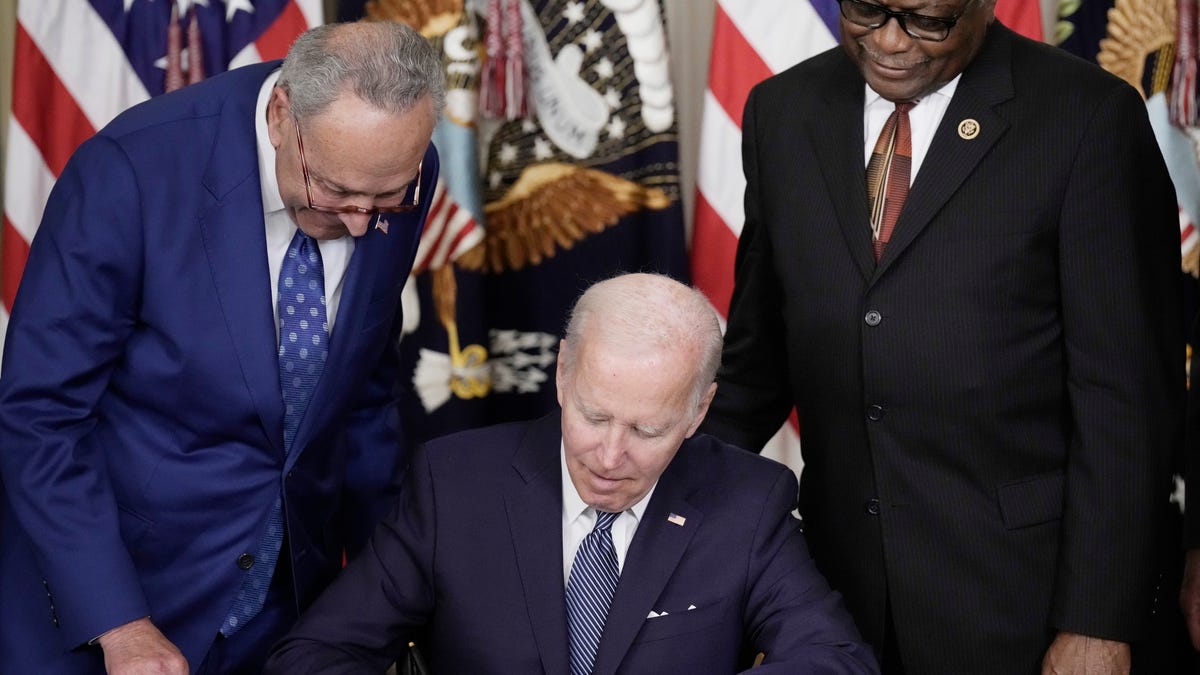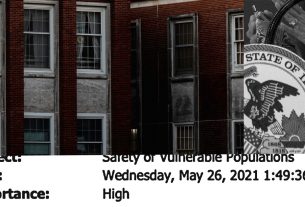[ad_1]

Joe Biden signs Inflation Reduction Act to tackle climate, health care
The legislation signed by President Biden aims to address climate change, lower prescription drug costs and provide health care subsidies.
Anthony Jackson, USA TODAY
President Joe Biden signed into law this week a Democratic-led legislative package containing hundreds of billions of dollars in climate spending and altering key health care and tax regulations.
The passage of the law, named the “Inflation Reduction Act of 2022,” marks a major victory for congressional Democrats and the White House, who have pursued approval of some version of the legislation for more than a year. Totaling an estimated $740 billion, it includes more than $370 billion of spending over the next decade in climate initiatives, as well as caps and cuts to some Americans’ drug costs and health care insurance premiums.
Money to pay for the new spending is expected to come primarily from new taxes imposed on billion-dollar corporations and stock buybacks, as well as amped up funding for the Internal Revenue Service to pursue tax evasion.
From USA TODAY: What the Democrats’ new legislative package will mean for you
Republicans, including those elected from Missouri, have harshly criticized the legislation after opposing it throughout the legislative process.
Some have zeroed in on the new money for the IRS, arguing that ordinary businesses and individuals will face unneeded additional scrutiny (Democrats say the agency is overburdened by filings and needs additional staff).
U.S. Rep. Jason Smith, who represents southeast Missouri and is the top Republican on the House Budget Committee, has said the law would not “put out the fire of inflation” that has been at the top of minds of many Americans facing higher food and energy costs. Missouri’s retiring U.S. Sen. Roy Blunt has called it a “reckless tax-and-spend bill.”
An analysis last week by the Penn Wharton Budget Project determined that the legislation would reduce the federal deficit by around $264 billion over a 10-year period. It’s unclear, however, what the immediate impact on inflation and rising prices will be.
Democrats, both nationally and at the state level, are touting the law as a historic and necessary fulfillment of key priorities, hoping to drive voter enthusiasm ahead of midterm elections this fall. On Thursday, the White House released a breakdown of how specific parts of the 730-page bill will impact the Show-Me State.
Health care
Out-of-pocket drug costs for Medicare patients: Seniors with cancer, multiple sclerosis or lung disease will see their out-of-pocket costs for prescription drugs capped at $2,000 starting in 2025. Improved financial protections will kick in a year prior.
Around 34,000 Missourians per year would pay above that cap, according to the Kaiser Family Foundation. Almost a million Missourians are enrolled in Medicare benefits that will see pharmacy costs capped under the policy.
Extension of tax credits for health care premiums: The law extends tax credits included in the American Rescue Plan Act that apply to health care premium costs through the Affordable Care Act marketplaces, which were set to expire at the end of 2022.
A quarter of a million Missourians have marketplace coverage and have saved around $820 annually through the tax credits, the White House says; those premiums increase for middle-income seniors. Around 49,000 small business owners and self-employed adults in Missouri have health care insurance through the Affordable Care Act.
The extension of the expanded coverage will also allow an estimated 29,000 Missourians to access insurance through the marketplace who would not have access without the bill, the White House says.
Insulin prices for diabetics under Medicare: Seniors will also see their monthly costs for insulin, which is required regularly to treat diabetes, capped at $35, a response by lawmakers to rising prices of the cheap-to-produce drug. Around 69,000 Missourians under Medicare used insulin in 2020, the White House said.
Democrats attempted earlier in the legislative process to expand caps on insulin prices to include private insurers. But Republicans in the Senate invoked specific parliamentary rules in early August to strip that measure out of the bill, while leaving the language applying to Medicare patients.
Out-of-pocket vaccine costs for Medicare patients: Some vaccines that fall under a certain Medicare program, including the shingles vaccine, will no longer require those enrolled patients to pay part of the costs out-of-pocket starting in 2023. Around 73,000 Missourians received vaccines that fall under the policy in 2020, and the White House says “that number is likely to rise as those vaccines become more affordable.”
Democrats’ climate, health care package: Biden signs ‘Inflation Reduction Act’ into law
Climate & energy – families and homes
Tax credits for solar and battery: An estimated “tens of thousands of additional Missouri households” will qualify for tax credits covering 30 percent of the costs to install solar panels and battery storage systems, reduce energy leakage or upgrade heating and cooling equipment. There are no income caps on these credits.
Community solar projects run by local businesses to save local families money on electric bills will also receive 30 percent tax credits. Additional credits will be available for affordable housing properties and projects in low-income communities.
Missouri state lawmakers also passed legislation this year barring homeowners’ associations from banning solar panels on homes.
Electric vehicles: Many Missourians will be able to receive upfront discounts on electric vehicles — $7,500 for new EVs and $4,000 for used ones. The discounts come as EV manufacturers, including Ford and Tesla, have raised their vehicle prices in recent months.
Rebates for energy-efficient appliances: Many households will qualify for 50 to 100 percent rebates for the installation costs of new water heaters, heat pumps, dryers, stoves and ovens. The White House says “millions of low- and moderate-income households are eligible for rebates.” The law also includes rebates for energy-related repairs and improvements in single-family and multi-family homes.
Flood and storm-proofing: A grant program will allow affordable housing projects in the state to apply for money for transportation projects and upgrades to protect against flooding, extreme heat and other stressors.
Climate in Missouri: Study projects state will see 125-degree days by 2053
Climate & energy – businesses
Clean energy jobs: The law will bring a range of investments in clean power generation and storage, the White House says, including bonuses for clean energy businesses that pay a prevailing wage (in Missouri, it is $75,000 or more for public works projects).
As of 2020, the state was home to around 51,000 clean energy jobs, primarily centered in the St. Louis and Kansas City regions, according to data from Clean Jobs Midwest. The White House’s 2021 estimate for the state’s amount of clean jobs is more than 54,000.
Small business energy tax credits: Missouri’s 500,000-plus small businesses can receive a tax credit of up to $5 per square foot for “energy efficiency improvements that deliver lower utility bills.” Other incentives include 30 percent tax credits for installation costs of low-cost solar power and buying “clean trucks and vans for commercial fleets.”
Tax credits for rural electric cooperatives: Cooperatives that service around 760,000 customers in Missouri — both commercial and residential — will be eligible for direct-pay clean energy tax credits. The law also allocates money toward those cooperatives to “boost resiliency, reliability and affordability” through clean energy and efficiency upgrades.
Galen Bacharier covers Missouri politics & government for the News-Leader. Contact him at gbacharier@news-leader.com, (573) 219-7440 or on Twitter @galenbacharier.
[ad_2]
Source link



